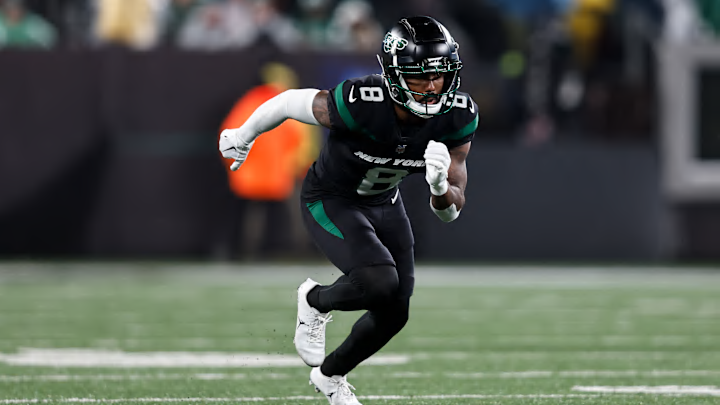The NY Jets parted ways with wide receiver Elijah Moore last week in a move that, in all honesty, was a long time coming. The former second-round pick openly requested a trade last offseason, and despite mending fences a bit, the relationship never fully recovered.
The Jets officially traded Moore and a 2023 third-round pick (pick 74 overall) to the Cleveland Browns in exchange for a 2023 second-round pick (pick 42). Essentially, they moved up 32 spots on Day 2 in exchange for their talented third-year wide receiver.
Some believe the Jets got the better of the deal, given that this is a player who has never even topped 550 yards in a season. Others see Moore's potential and believe the Jets should have gotten more in return.
So who's right? Did the Jets or Browns win the trade? As with any trade, it's not really that simple of a question.
We don't know if the NY Jets won the Elijah Moore trade
The best way to analyze this trade is to first determine exactly what value the Jets received in return. Using Jimmy Johnson's standard trade value chart, the difference between picks 74 and 42 is roughly equivalent to the value of the 66th overall pick in the draft.
That means the Jets essentially received a high third-round pick in return for Moore. This is an inexact science, however. The model doesn't account for the quality of a draft class, and some believe it's a little outdated.
For instance, ESPN's model, per Seth Walder, has the value as nothing more than a fifth-round pick. That certainly seems a bit low, but there are various methods of gauging draft pick value.
Let's look at it from the Jets' perspective first, specifically in regard to the upcoming Aaron Rodgers trade. This deal heavily suggests that the Jets hoped to retain not only the No. 13 pick in the draft but also their high second-round pick. Making this trade allows them to do that.
The Jets now possess picks No. 42 and 43 overall in the second round. The assumption is that one of those picks will be sent to the Green Bay Packers for Rodgers, but the Jets will likely be able to hold on to one of them now.
We can look at the Moore trade as a simple math equation. The Jets believe that the value of the player they select at pick 42 or 43 and whoever they replace Moore with (Odell Beckham?) is greater than the value of Moore and the player they'd select at pick 74.
Say the Jets draft Minnesota center John Michael Schmitz with either the 42nd or 43rd pick and sign Beckham to replace Moore. Would you rather have Schmitz and Beckham or Moore and the 74th pick? It's a fair discussion.
Now, Moore hasn't come close to scratching the surface of his potential. The former Ole Miss standout had a stretch during his rookie season in which he was legitimately one of the most productive receivers in football.
This time last year, the narrative around Moore was that he was on the verge of a sophomore breakout season. He was seen as the Jets' de facto No. 1 wide receiver entering the year. It's easy to forget now, but Moore seemed like a big part of the Jets' future just a few months ago.
The Browns see that potential in Moore, and if he even comes close to realizing that potential, it'll be hard to justify this trade in the future.
The Jets were willing to deal Moore, at least partially as a result of his controversial trade request last year, for the increased draft flexibility it provided. It's a risky move on their part — it's rarely wise to trade away a talented young starter on their rookie contract.
But it's a risk they were willing to take.
So, who won the trade? It's too early to say, but the Jets are the ones assuming a larger risk. The Browns bought low on a player they view as a potential future offensive cornerstone. It's hard to argue with that strategy.
